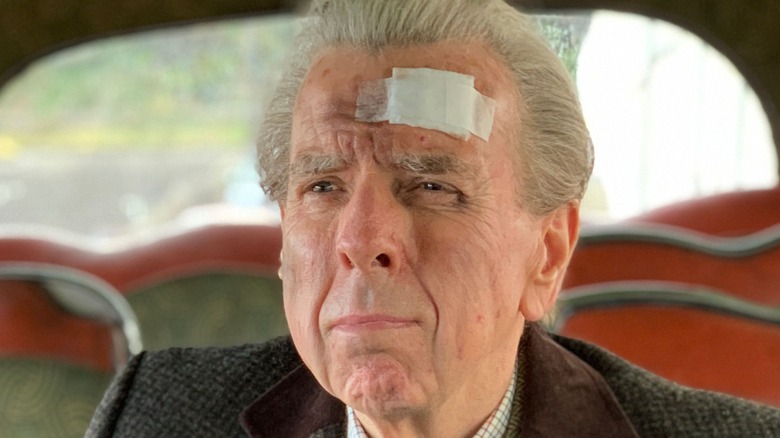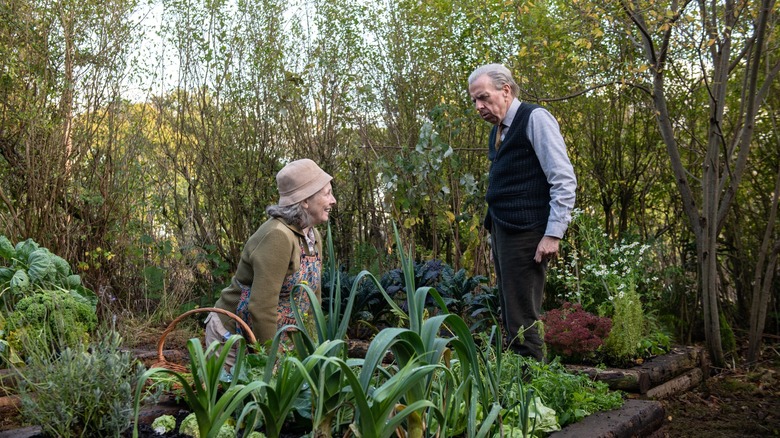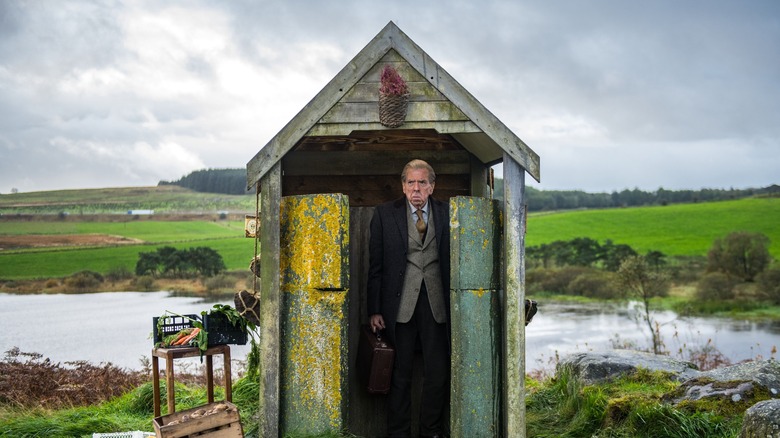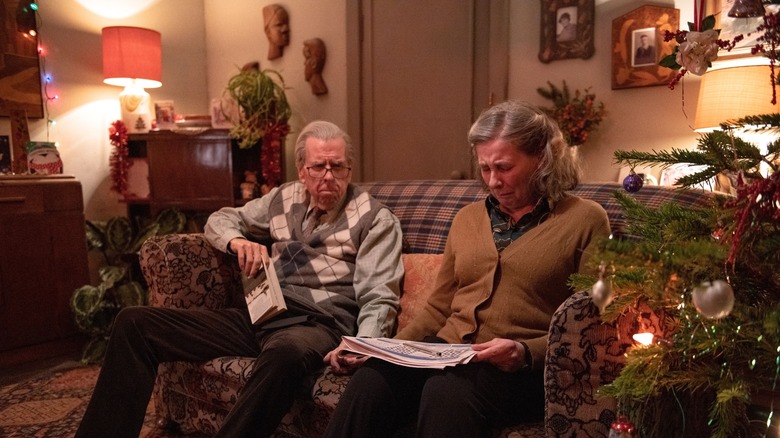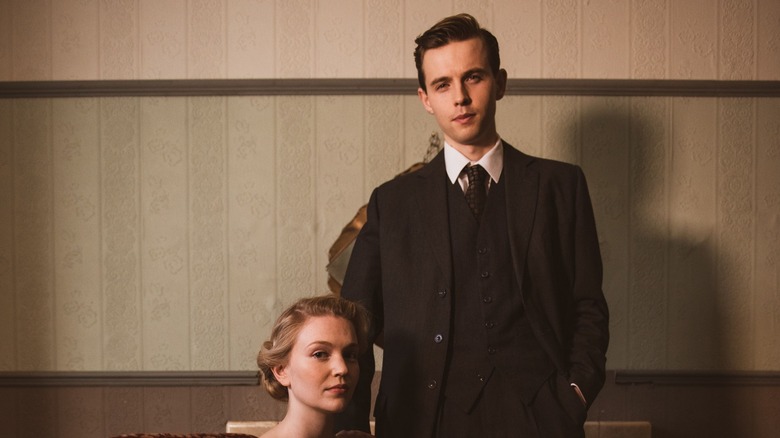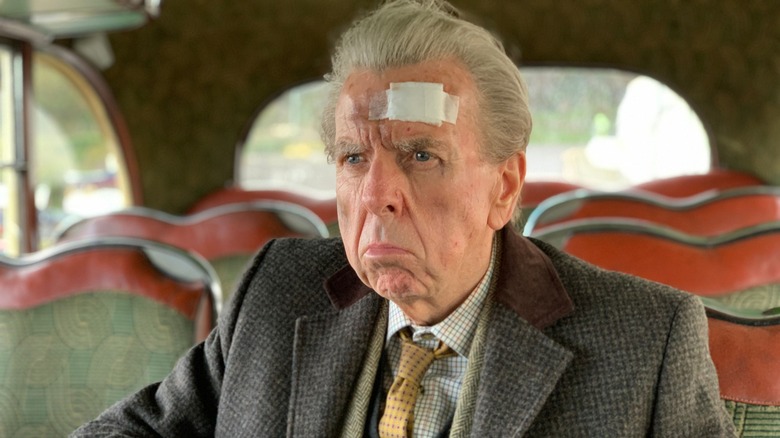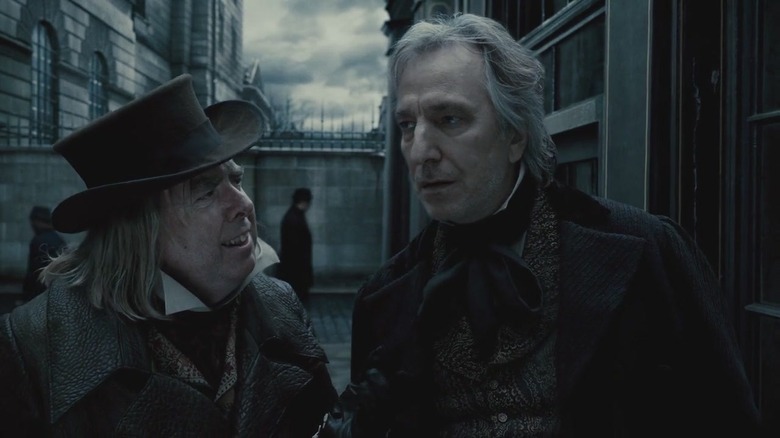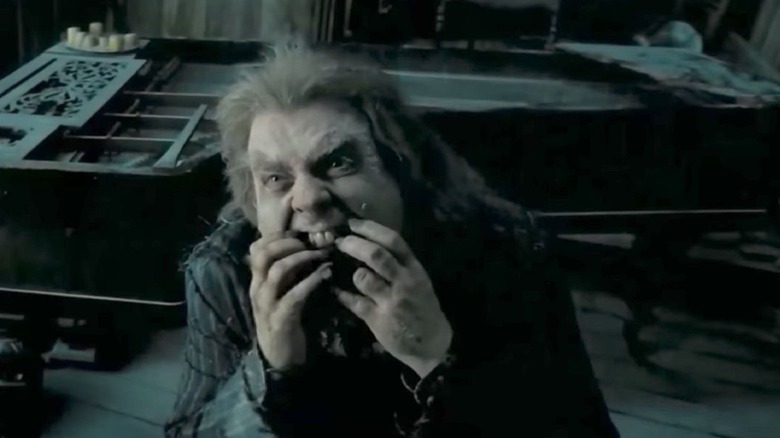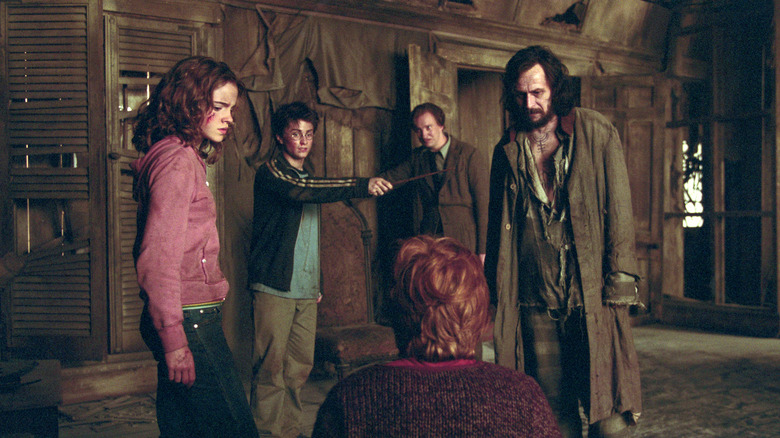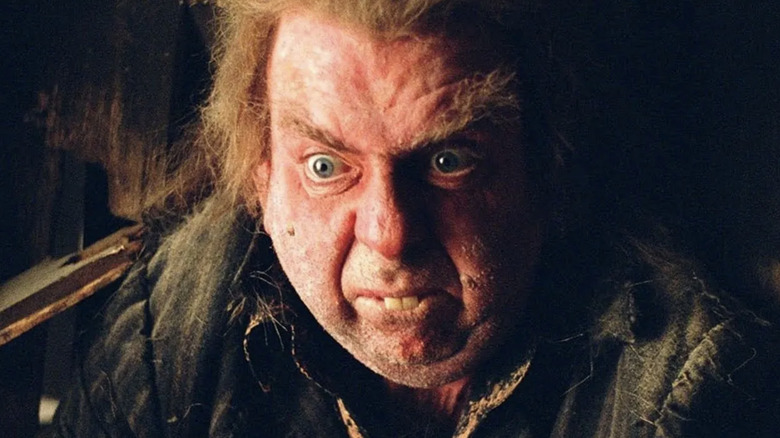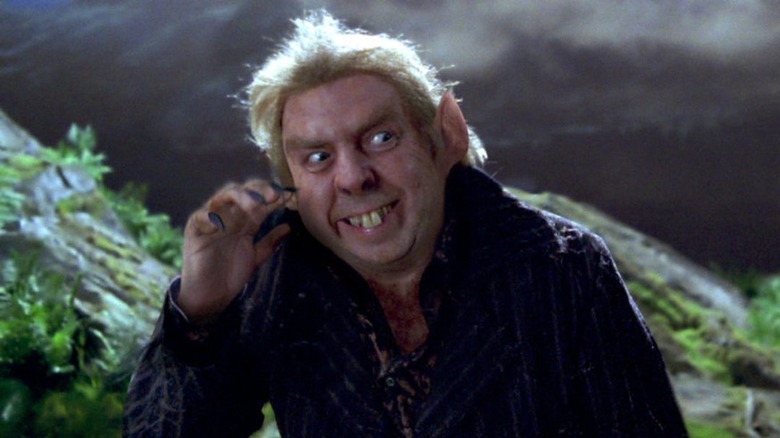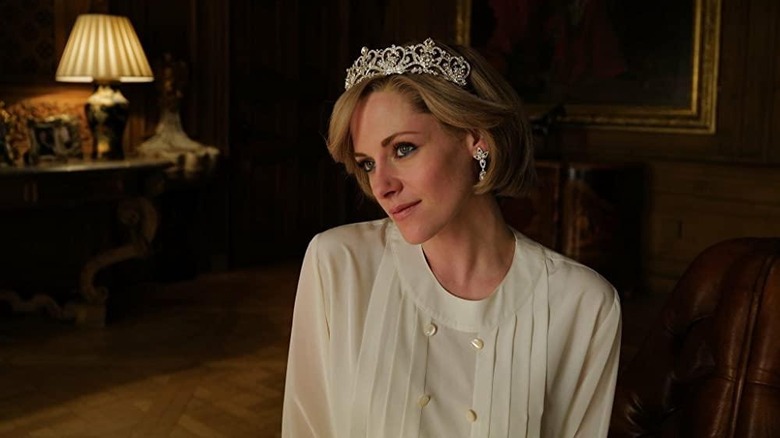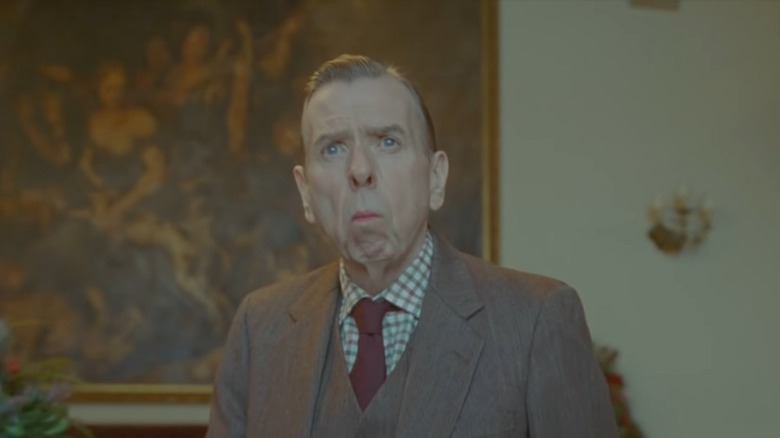Timothy Spall Discusses The Last Bus, Alan Rickman, Harry Potter, And Spencer - Exclusive Interview
There's no doubt that legendary British actor Timothy Spall has likely starred in one of your favorite films — you just might not recognize him under the hefty amount of CGI and costumes that sometimes accompany his characters. Fans certainly love his villainous work as characters like Peter Pettigrew in the "Harry Potter" series and Beadle in "Sweeney Todd." However, Spall's latest film venture, "The Last Bus," tasked the actor with playing a dying man on a journey to honor his wife's final wishes. His courageous character Tom and even the film's heartwarming premise are a far cry from roles like Pettigrew — and Spall does a stunning job portraying the aging man with nothing to lose.
In addition to his work on "Harry Potter" and "Sweeney Todd," Spall is known for playing another Thomas on "Vanilla Sky," alongside Tom Cruise. The actor also starred in the 1996 iteration of "Hamlet," "Enchanted," "A Series of Unfortunate Events" (2004), and he recently starred in "Spencer" alongside Kristen Stewart. The actor's jam-packed resume could fill a book. On his journey to becoming a Great himself, he's worked alongside some of the most iconic actors of our time with truly gripping performances — whether he's a hero, a villain, or someone in between.
Timothy Spall spoke to Looper in an exclusive interview where he talked about the nuances of life and death in his new film "The Last Bus," the movie's scenic filming locations, and doing what's right even when it's difficult. He also reminisced about working with the late great Alan Rickman, discussed Peter Pettigrew's "Harry Potter" ending, and working with Kristen Stewart on "Spencer."
A character study on grief
I love the movie so much. It's so beautiful and heartwarming and such a sweet film that beautifully tackles grief and perseverance. What drew you to this story, and why do you think fans need to see this kind of movie in today's climate?
Well, I'm glad that you liked it, and I agree with all those things you say about it. In simple form, it's a story about love and loss and a kind of a duty that somebody feels to lay the ghosts for [themself and their loved one]. The love is lost and the love they lost a long time ago, and also how in the last moments of someone's life, where they're undergoing one of the biggest odysseys, going towards [the] inevitable, they actually oddly come to life again through discovering the world through their eyes of being somebody who is in a state of death, in a bizarre way.
It sounds terribly morbid, but there [are] areas of humor in there, [there are] areas of black humor, areas of simple humor out of love and fun and ridiculousness. It's that thing of finding a kind of optimism — an adventure in your last moment. For some people, you never know when your last moments can be. This guy happens to be very, very old, but [there are] things that he should have done, he and his wife should have faced up to 50, 60 years before that, which they haven't done, and this is what he needs to do for the both of them.
Scotland's scenic aesthetic
"The Last Bus" has some lovely scenery, and you get to see a lot of it during the bus scenes and then that final location. Do you have a favorite location that you filmed at during the film?
We did a lot of it in Glasgow and around about. Scotland has a reputation of being beautiful. It is. It's dramatic and gorgeous. Also, it rains a lot, so that always slightly tempers the romance of the place, but it is fantastic. This is a journey that goes through all that wonderful landscape, but then into [an] urban area, into areas that aren't so salubrious or desirable, where on the face of it this brutal architecture and so on and so forth contains some of the most warm-hearted people, people with backgrounds which aren't privileged particularly. [They're] normal, ordinary people who take him into their hearts and so on and so forth and those who reject him. This film is a kind of mixture of the beautiful and the [beauty] within people and the beautiful nature of the topography of the British Isles.
Doing the right thing even when it's difficult
There's a great scene where your character sticks up for a woman getting harassed on the bus while everyone else stays silent. What stood out to you about this scene, and why do you think it's important to speak up when you see an injustice, even if you're standing alone?
It's hard. It's very hard these days, harder these days in a sense because [there are] so many different people with so many different opinions about what is standing up for some people [versus] encroaching on somebody's right to be either protected or someone's right to be expressing their opinion. It's a very difficult thing, but this is an old man from a [different] generation, but also a man who understands that bullying is not good in any faction. The guy himself is in trouble who's doing it. He has to stop him. It's also, because in a sense he's lived such a life, he's frail and very, very old. Because he's also very ill, there's an odd fearlessness about him that he was drawn to, and he becomes not frightening but formidable because he is old and frail. He's quite strong, but he has an old-fashioned sense of decency and what is right.
To think that's just an older generation thing is wrong. It's inaccurate because I see it all the time. We were in Italy recently. My wife slipped on a paving stone, a marble paving stone. Even before she'd hit the ground, two young guys in a car had stopped. She was back on her feet, waiting by the lights. They'd driven off before she'd even ... and this is in a sort of area of Italy that's supposed to be not very nice.
To be guilty of thinking it's a gone thing, it's not. I think if we really look at social media, [the] more negative side of social, you'd think we're living in a hell, but we're not as much. As there [are] bad things, there are still in the younger generation, the upcoming people, just as much care and consideration there always has been. It needs to be allowed to breathe a bit more, not be quashed down by this so-called notion of negativity that pervades everything, because we know it isn't really when you encounter it. It's there, always there. If you read comments, you'd think we were living in hell. We're not.
The last bus of life and death
The flashback sequences unravel in a wonderfully artistic way. How do you think the setup and flow of the present time versus the flashback sequences and some of those hallucinations as well add to the story where viewers are sort of on their own bus ride through Tom's life?
It's easy to write the aged off and forget that they were kids. They might have been sexy once, attractive, desired. Do you know what I mean? That notion of when you see older people is very difficult to work out. When you go back, and you see this very gently laced in history, which reveals why he is on this journey and this thing that happened in their life that spoiled their life, that nipped something in the bud of the love, their passion for each other and the joy of their youth and their first coming together, you realize that in this old, somewhat decrepit man there's this amazing history of all of these things.
This being a good-looking young guy with a very beautiful young wife and everything before him, and this slow, gentle reveal of this thing [that] happened in their life that didn't spoil it but tainted it, left them with undone business in them. Anybody, even the most so-called insignificant person on earth, always has their own story riddled with the tragedy and the justice and the injustice, the comedy, the lunacy of any king's life, any person's life. It's as interesting as anybody else's on a different level, in different degrees — less broadcast. We've all got our own stories, and this is a classic example of somebody who is eminently ignorable as far as the world is concerned, but not as far as life's true stories and narratives.
Every minute detail matters
I was also blown away by some of your small acting choices. You conveyed so much emotion and compassion with your character with something as little as a hand gesture, a shaky disposition. What was your process like in really nailing down Tom's illnesses and honing in on that deep compassion that he has for others?
It's always a hazard when you start talking about the process of acting because it's pretty [self-indulgent frankly], or it sounds like you're going on about yourself. I suppose it's unavoidable if you've asked a question. You think a lot about it, and rather than display it, you try and think and think and let it percolate within you. I had very little makeup, just had a wig, and I am playing somebody who's 90. As I say, I'm no spring chicken, but I'm not 90. To feel that loss of gravity, that loss of the battle of gravity within physically and the frailty that comes with that, the fact that a paving stone from going up the road to a thing or a stone or something slippery is the equivalent of a bear trap to somebody who's 90 — it looks like a piece of a can to somebody, but to an old person, that could be a potential five weeks in hospital.
There's that, but also the fact that [there are] so many liars. There's a gateau of experience. There's a lot of thought. There's a lot of dealing with stuff that goes on. It's about marinating yourself and the thought and understanding — going through the process, going through the layers, and then letting them percolate within you rather than display them. If you're doing that, it's in there, but you have to think about it and have thought about it carefully for it to be in there for you to be able to not to display it, chuckle all over the place.
Remembering the kind and talented Alan Rickman
Switching gears a bit, you got to work with Alan Rickman in both "Harry Potter" and "Sweeney Todd" in villainous roles. What was it like getting to work with him? And do you have any fond memories you shared with him either on or offset?
The one thing I can tell you about Alan, considering that, apart from the tragedy of his loss and losing him at such a young age, really, in this day and age, he practically played so many sinister, rather formidable, terrifying characters — not always, but [he] was brilliant at it. The man himself was so different, [he] was so warm, was so kind and genuinely kind. On "Harry Potter," even when he wasn't working, there wasn't a day when he wasn't coming in with a group of kids. There [were] always phone calls, "Can I come on the set?" He'd be bringing friends' children to show them around.
On one occasion, he met my mother-in-law, who was with my wife. He wasn't used to meeting really anybody, apart from me, and he was absolutely charming with her. He was a really charming, very witty and deeply intelligent and funny man, and also very, very bright — and actually one of the best actors of his time, really. We've had the privilege of having him and the tragedy of losing him. It was great to work with him.
The death of Peter Pettigrew: Books vs. Movies
In the "Harry Potter" books, Peter [Pettigrew's] death scene is such an interesting pseudo redemption arc because he owed Harry his life, but the magical hand that Voldemort gifted him views his life debt as weak, and Peter strangles himself to death against his will, which is a poetic end to a character who basically killed his best friends. What are your thoughts on this ending compared to the one that Peter gets in the film? Do you wish you could have explored the book's more nuanced ending for Peter, or do you like the film's comedic end for that character?
Well, funny you should say that because there [was] a big debate about whether the hand strangling itself was going to be pretty close to "Monty Python." Do you know what I mean? Or something out of a... Where you read it narratively, and you have all that poetic underpainting that you are talking about there, [it's] very difficult to show that, somebody with a rogue hand [killing themselves without looking like] Inspector Clouseau.
One of the things I always liked about Peter Pettigrew is that he is reprehensible, and he is a weak, cowardly, devious character, but there's also a little [bit] of possible redemption about him. Anybody who is driven to do things through weakness is not doing it through pure evil — they're doing it through self-survival. I think he is very much from that area, bullied and called the fat kid and the "so [and so]" kid and a lump of a boy. [He's] always the butt of the jokes of the rest of them and ultimately ends up being one of the most powerful, albeit via his nefarious deeds.
His comeuppance is poetic, but it's also one that's [comically] tragic ... I always had the image of Fritz Lang's "M" with Peter Lorre, the mass murder, when [for] such an evil character, you cannot help but feel pity for him, his ultimate demise.
There's history of the evil, so-called evil [people] are often people who are weak or driven by something that's really some injustice, some indignity in them that creates this action that makes ... It ultimately is a very, very unpleasant way of self-survival, and you choose to use the evil route to survive rather than be kind and get smashed. It's a lesson for life, really, and understanding and ultimate compassion. Maybe we can eradicate it through understanding it. Bit of a cry for understanding from [an] entertainment [point of view], but there we are. There's always a deeper question, even in the lightest question.
A generation of icons
You also have a brilliant scene with Dan Radcliffe, David Thewlis, and Gary Oldman in the third film during Scabbers' big reveal and the first confrontation between Peter and his former friend since he betrayed James and Lily. What was that scene like to film?
It wasn't until afterward that I realized there was Gary, there was David Thewlis, Gary Oldman, Alan [Rickman], and myself all of the same generations and with Daniel — and all funny — all playing public schoolboys, boys that go to paid school, but all from working-class backgrounds. All these actors that I think are amongst the best in Britain, so I was really rather delighted by that. Not that I'm an inverted snob, but that was always something that I think, "Actually, how bizarre is this in a world that ... particularly in the English class system, there we are, all playing these public schoolboys but all from humble backgrounds." Also, the fact that these are three, and Daniel was a delightful boy, [a] young actor then, a young man and [an up and coming] actor, that these three are not only three of my contemporaries, but three of my favorite actors and three of the people I've always felt like, "This is great."
These are the people I like, and the fact that we were all together was a wonder ... I was thinking [of] Pablo Larraín, who directed "Spencer," [and] Alfonso Cuarón, who directed ["Prisoner of Azkaban"] that he was so convincing about asking me to play the role. I wasn't sure about it because I had to ask my daughter all about the books, and I then found out more [about] it. She's now in her thirties, but she was my "Harry Potter" executive advisor. When we were all together, all playing these parts, I thought, "This is a great moment." The fact that we're all in "Harry Potter" — every time we went into makeup in the morning, there'd be some eminent British actor having a nose stuck on or a pair of ears or an eyeball screwed. It was all really charming, and all of them paid their dues — seen in it and done it. [For] everybody, it was a lot of good nature on it and plenty of good anecdotes, I'll tell you.
The nuances of becoming a rat
I watched a decent number of horror films as a kid, but Peter Pettigrew still managed to freak me out. How did you get Peter's rat-like qualities and movements down so perfectly? What do you think it is about him that makes him such an unsettling villain, and how did that process of getting all those prosthetics play out, and how long did that take?
I'm reluctant to admit it, but I didn't wear makeup. I only had a pair of ears and teeth. The rest of it is just me or ... Well, I think it's funny that you are not ... you are a young person, so you would've watched it originally when you were very young. It always surprises me that people found him so frightening because I never was trying to play him frightening. I was trying to play him in the way from all [those] things that I mentioned before, all these elements of what makes him the way he is. I suppose that whole thing of looking at rats, thinking about them, and I'm thinking how they are, what their hands look like. If you ever look closely at a rat's hand, it has a very particular, almost human quality to it when you look at it. It looks like it's a horribly manicured hand of a very old man.
A long life in rat years
There was that, and then there's the look. There was that hunch, slightly, and then when I was in discussion with the costume designer talking about the boots, which were slightly Cuban-heeled to bring him up and his back down, they put little toes on it. He had ... all these little things, and then his coat, this kind of '70s disco suit, this dress-up and that kind of weird mullet kind of thing that [were] done like in a rats thing on the back, they dragged out the back, so it looked like he'd been in this suit for 50 years and it turned into a tail at the back.
[With] all this building up and the makeup, all these different craft people, costume design, [and] me doing what I was doing physically and the makeup, these are all the things that [mean] ultimately, you are playing somebody who happens to have been a rat for quite a long time but is not human, but a witch, really — a wizard. It's playing all this, but ultimately, a wizard with these human traits of indignity and feeling a sense of revenge as a tool to survive.
You're going to be challenging and not particularly seemly or acceptable to the eye if you have spent most of your life as a rat. How long is that in rat years? He was however old he was in the film, but that rat, in rat ages, he spent probably about 400 years as a rat. That's a long time to be down there, and [he] spent maybe half his time not only in Ron's bedroom amongst these smelly old sneakers, but also occasionally a little visit down to the sewers to see if he can find any help.
Kristen Stewart: Becoming Diana
You were recently in the movie "Spencer" with Kristen Stewart. What was it like working on that film with her? As someone who lived in England during Princess Diana's time, how do you think Kristen and the movie as a whole represented the late Royal?
The movie advertises itself from right at the beginning as a fable based on a true tragedy, so it is saying, "This isn't purporting to be real." That being said, it's very, very well researched. Who knows what goes on in the life of the Royals? Nobody knows. "The Crown" has made 55 episodes about it brilliantly. It's conjecture, but I knew ... I was on day two of principal photography. As soon as Kristen walked on the set, I knew that she had [gotten] it spot on, as soon as she walked in and started speaking.
I'm playing, in a sense, the antagonist. I'm spending a lot of the film telling her off, quietly and respectfully, how to behave. I knew as soon as I saw her that she had, to use an American term if I may, "slam dunked it" straight away from day one.
I know that only comes from thought, research, a lot of thought, and being a brilliant actress. I thought instantly — not only did I think that, I thought, "My goodness, she's being good." I thought, "This is where she's showing how ... We all know she's good, but this is how she's showing how really good she is." She was brilliant in everything. Every scene, I thought, "She got every note right." The film, if I'm going to be objective about things that are in it, it's very interesting, very different to "The Crown," very different telling and much more of a psychological ride ... There's a mixture [drama and] tragedy. Funny at times — black comedy, and also a bit of a psycho horror. I think it owes more to "The Shining" in some aspects than "The Crown" ... all those characters are lost.
A royal affair
Perhaps [Sally Hawkins and] my character [are] the least lost because ... [they know their roles]. He represents what that function, that mystery, how the mystery of the Royal Family is maintained through the adherence to a thousand years of tradition. [That includes] certain decorum and certain activity that's lasted longer, and the institution is bigger than the individual, bigger than the emotional considerations of the individuals. He is the most together, and having said that, perhaps one of the least palatable.
All the same, he does represent it, but as a film, it's much more about a spirit that doesn't fit in with the heaven or the hell it's introduced into, or the mixture of the two. As we know, there's the thing, then there's the reaction to the thing. There's the thing, and there's the perception of the thing.
If ever a thing has been overloaded with perception, it's to [the] Royal Family. It's constantly cogitated on — investigated. Only those within it will ever know what it's like. Maybe the whole principle of show business is there's a kind of [privelege] to that because we are lucky enough to be in the world of making stories. We're only purely storytellers. That's what we do, for people to watch and go out at night or watch the telly and be told a story.
The Royal Family is an ongoing story. Its principle is to be a function, an ancient function and representative of something that is ancient and anachronistic to [a] certain degree, but is ultimately British and represents something a bit like the presidency does in America. It also, like show business, we get a lot of fly on the wall stuff about show business, nobody really knows how it's done. It's a mixture of a thousand different elements that come together to create a simple story. Apart from the fact that she's a great actress, Kristen has experienced a lot of scrutiny, as we know from the media. She'd have a pretty clear idea how Diana Spencer felt.
"The Last Bus" is now available to rent on digital platforms.
